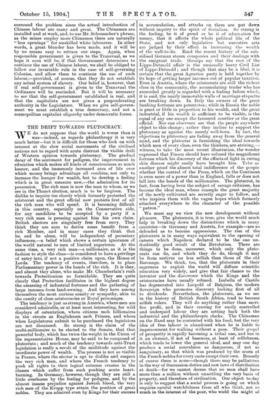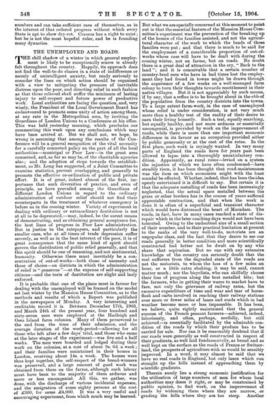W E do not suppose that the world is worse than
it was—indeed, as regards philanthropy it is very much better—but it is difficult for those who look on with interest at the slow social movements of the civilised nations not to regard with acute distrust the visible drift of Western opinion towards plutocracy. The gradual decay of the sentiment for pedigree, the improvement in education which makes all kinds of consciousness so much keener, and the immensely increased area of life over which money brings advantage all combine, not only to increase the hunger for wealth, but to develop a feeling which is in great measure new,—the admiration for its possession. The rich man is now the man to whom, as we see in the Thanet election, much is to be forgiven. The dislike to inquire too closely which formerly protected the aristocrat and the great official now protects first of all the rich man who will spend. It is becoming difficult in this country, especially on the Conservative side, for any candidate to be accepted by a party if a very rich man is pressing against him his own claim. British electors are singularly free from envy. They think they are sure to derive some benefit from a rich Member, and in many cases they think that he, and he alone, will be independent of pecuniary influences,—a belief which shows a certain ignorance of the world natural to men of limited experience. At the same time, a very rich man—a millionaire, as it is the fashion to style the class—is considered to have a privilege of entry into, if not a positive claim upon, the House of Lords. The tendency of events, therefore, is to place Parliamentary power in the hands of the rich. It is they, and almost they alone, who make Mr. Chamberlain's rush towards Protectionism so formidable. They see quite clearly that Protection facilitates in the highest degree the amassing of industrial fortunes and the gathering of large incomes from land-owning. And they have among themselves the most curious comity or sympathy, akin to the comity of close aristocracies or Royal personages. The tendency is just as strong in America, where men are considered admirable, or at least most interesting, for wild displays of ostentation, where citizens mob billionaires in the streets as Englishmen mob Princes, and where when Legislatures submit to be purchased the legislators are not dismissed. So strong is the claim of the multi-millionaire to be elected to the Senate, that that powerful body, which has twice the weight in the Union of the representative House, may be said to be composed of plutocrats ; and much of the tendency towards anti-Trust legislation is really a revolt of the multitude against the inordinate power of wealth. The process is not so visible in France, where the elector is apt to dislike and suspect the very rich man, and where the French tendency to push all rights to their logical extreme creates in the classes which suffer from such pushing acute heart- burning. In Germany, however, though they are still a little overborne by the feeling for pedigree, and by the almost insane prejudice against Jewish blood, the very rich men of the Krupp type attain the position of great nobles. They are admired even by Kings for their success in accumulation, and attacks on them are put down without inquiry to the spirit of Socialism. So strong is the feeling, be it of greed or be it of admit ationfor money, that it affects the whole political life of the State, and not only legislative but executive acts are judged by their effect in increasing the wealth of the well-to-do. Read the recent history of the sub- sidised German steam companies and their dealings with the emigrant trade. Gossips say that the root of the Lippe-Detmold affair is the unusually heavy Civil List of Lippe-Detmold ; and though that may be a libel, it is certain that the great Agrarian party is held together by its hope of getting larger incomes out of popular taxation. Even in Austria, where the aristocrats are still the richest class in the community, the accumulating trader who has succeeded greatly is regarded with a feeling before which, it is said, the nearly immovable walls of marriage etiquette are breaking down. In Italy the owners of the great banking fortunes are potentates ; while in Russia the noble is great or little in proportion to his wealth, and the great industrial, if his wealth is sufficient to be visible, is the equal of any one except the favoured courtier or the great official. Nor can observers see that the people anywhere object to this change ; rather they incline to support the plutocracy as against the merely well-born. In fact, the objections to plutocracy are fading away from the general mind, and the plutocrat is furnishing the ideal towards which men of every class, even the thinkers, are striving,— witness, to take the most recent illustration, the wonder expressed that Finsen should have refused the magnificent fortune which his discovery of the effects of light in curing skin disease might easily have brought him. Take as another proof the almost total indifference of the people whether the control of the Press, which on the Continent is even more of a power than in England, falls or does not fall into the hands of the millionaires. The plutocrat, in fact, from having been the subject of savage criticism, has become the ideal man, whose example the great majority of the newly cultivated are secretly eager to follow, and who inspires them with the vague hopes which formerly attached everywhere to the character of the possible "patron."
We must say we view the new development without pleasure. The plutocrats, it is true, give the world much help in breaking down the distinctions which in many countries—in Germany and Austria, for example—are so defended as to become oppressions. The rise of the plutocrats is in many ways equivalent to the opening of careers which Napoleon declared to be the one un- doubtedly good result of the Revolution. There are things to be done, moreover, which only the pluto- crats can do, and which they do do, though it may be from motives no less selfish than those of the old Baronage. We think, too, that the plutocrats in their eagerness to exploit the world will diffuse scientific education very widely, and give that fair chance to the inventor and the discoverer which the Kings and the aristocracies have usually refused. Isabella of Castile has degenerated into Leopold of Belgium, the modern Sovereign who promotes discovery looking first of all to dividends. Nevertheless, the plutocrats, as we see in the history of British South Africa, tend to become selfish rulers. They will do anything rather than sacri- fice profit, and in their craving for easily controlled and underpaid labour they are setting back both the industrial and the philanthropic clocks. The Chinaman on the Rand may be contented with his food, but the very idea of free labour is abandoned when he is liable to imprisonment for walking without a pass. Their gospel of prosperity is rapidly becoming a tribal one, and has in it an element, if not of baseness, at least of selfishness, which tends to lower the general ideal, and may one day produce a social convulsion as dangerous, if not as sanguinary, as that which was produced by the scorn of the French nobles for every caste except their own. Remedy of course there is none—though there may be palliatives in the way of Succession-duties and new laws of distribution at death—for we cannot decree that no man shall have more than a million without unsettling the very basis of property, and therefore of civilisation. Our object to-day is only to suggest that a social process is going on which requires careful watchfulness from all who think, not so much in the interest of the poor, who wield the might of numbers and can take sufficient care of themselves, as in the interest of that ordered progress without which every State is apt to show dry-rot. Crassus has a right to exist; but he is not the most hopeful ruler, and he is founding many dynasties.
THE UNEMPLOYED AND ROADS.











































 Previous page
Previous page